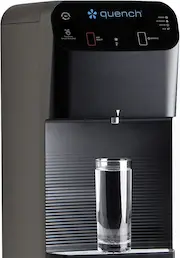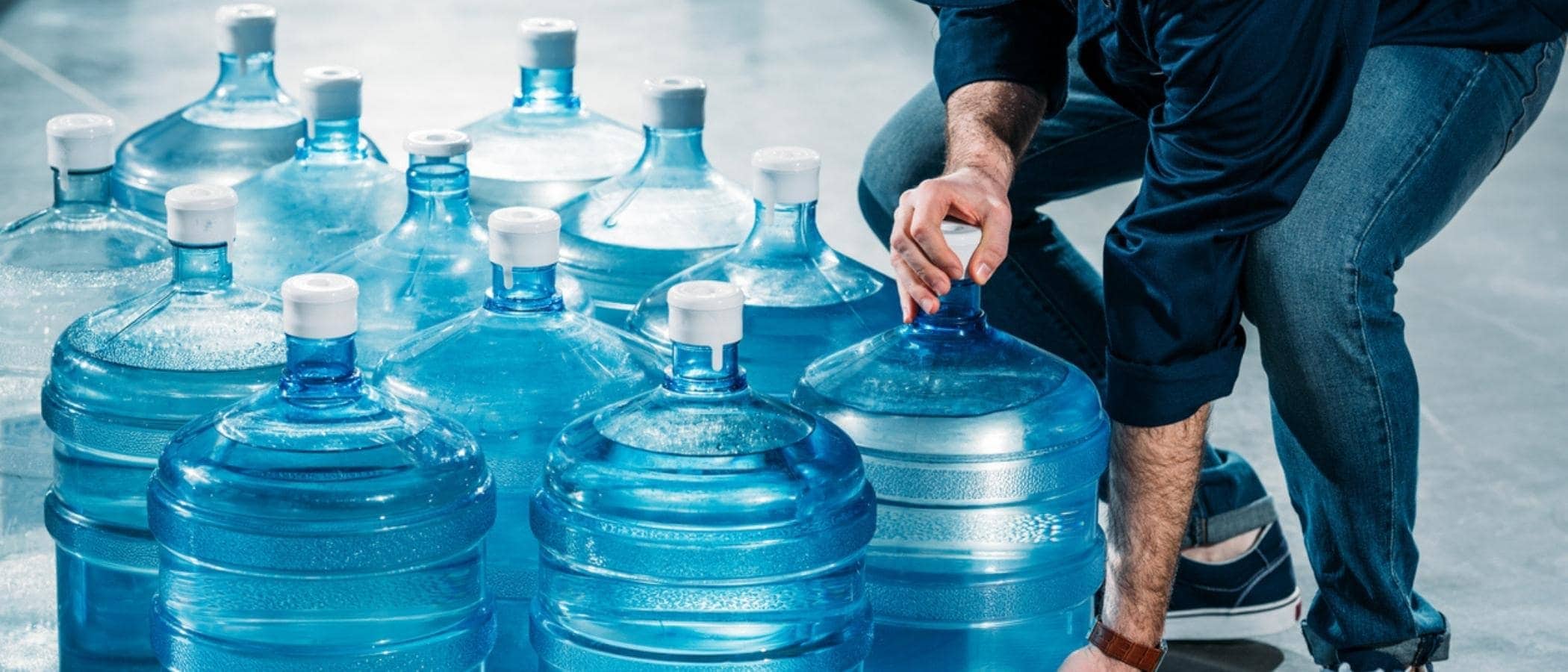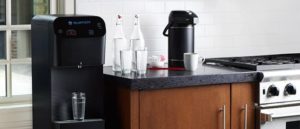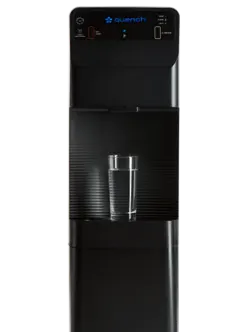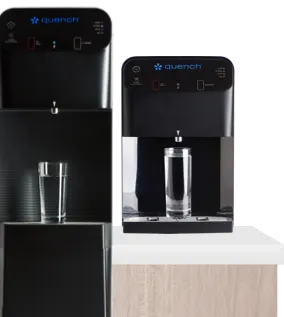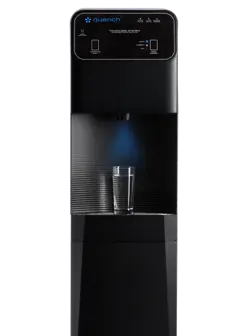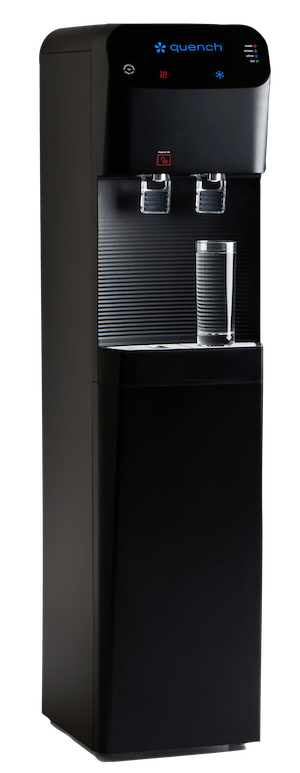It’s within your water bottles, food containers, and more. What are we talking about? It’s Bisphenol A — more commonly known as “BPA” — a synthetic compound used to make a variety of common consumer goods.
BPA makes for a sturdy, clear polycarbonate plastic that’s cheap and very effective. It might be in your cupboards right now, disguised as your favorite water bottle. Is that such a big deal?
Think about it this way: You probably wouldn’t drink liquefied plastic. So why would you want even a small amount of this chemical leaching into your water supply?
Let’s take a closer look at BPA to identify the risks, myths, and solutions that help you limit exposure.
BPA and Its Effect on Our Bodies
Because this chemical is found in so many everyday products, researchers have started to investigate the effects of BPA on human health. A study by the Centers for Disease Control (CDC) found evidence of this chemical in nearly all of the 2,517 people tested, indicating that just about everyone may have experienced BPA exposure.
If that statement makes you a little nervous, you’re not alone. Most people have heard that BPA comes with a long list of negative human health effects — for example, Mayo Clinic mentions a possible link between this plastic chemical and increased blood pressure, cardiovascular disease, and more. However, there’s good news.
According to the Food and Drug Administration (FDA), “BPA is safe at the current levels occurring in foods [and food packaging].” Simply put, the BPA level in your everyday life, especially dietary exposure, likely doesn’t pose a health risk.
That doesn’t necessarily mean you should throw caution to the wind and grab every plastic item you see. The truth is that, while BPA exposure is generally considered to be safe, there are still some studies indicating that certain exposure levels and types are questionable.
Here are some of the potential human health effects of BPA exposure:
- Arrhythmia: In an animal study, BPA was found to override a female body’s heartbeat signaling. This caused arrhythmia, which is an irregular beating of the heart that could lead to sudden cardiac death.
- Weight Gain: A study from The Journal of Clinical Endocrinology & Metabolism correlated higher BPA concentrations in the body with generalized and abdominal obesity as well as insulin resistance.
- Higher Blood Pressure: In a study from Hypertension (an American Heart Association® journal), 60 adults underwent a randomized crossover trial where they consumed the same beverage in 2 glass bottles, 2 cans, or 1 can/1 glass bottle at a time. When they measured urinary BPA concentration after consuming the canned beverages (with BPA), systolic blood pressure increased.
- Food Intolerance: In a study by the Federation of American Societies for Experimental Biology, 2 groups of pregnant rats were observed. One group was exposed to BPA only while babies were weaned. The BPA-exposed group of rats displayed colonic inflammation — suggesting food intolerance — when they were fed a new food protein later in life.
- Lower Sex Drive: Some studies have indicated that BPA acts like estrogen in the body, which can disturb men’s sex hormone levels. For example, a study from Fertility and Sterility found that chronic BPA exposure could lead to lower testosterone levels in men.
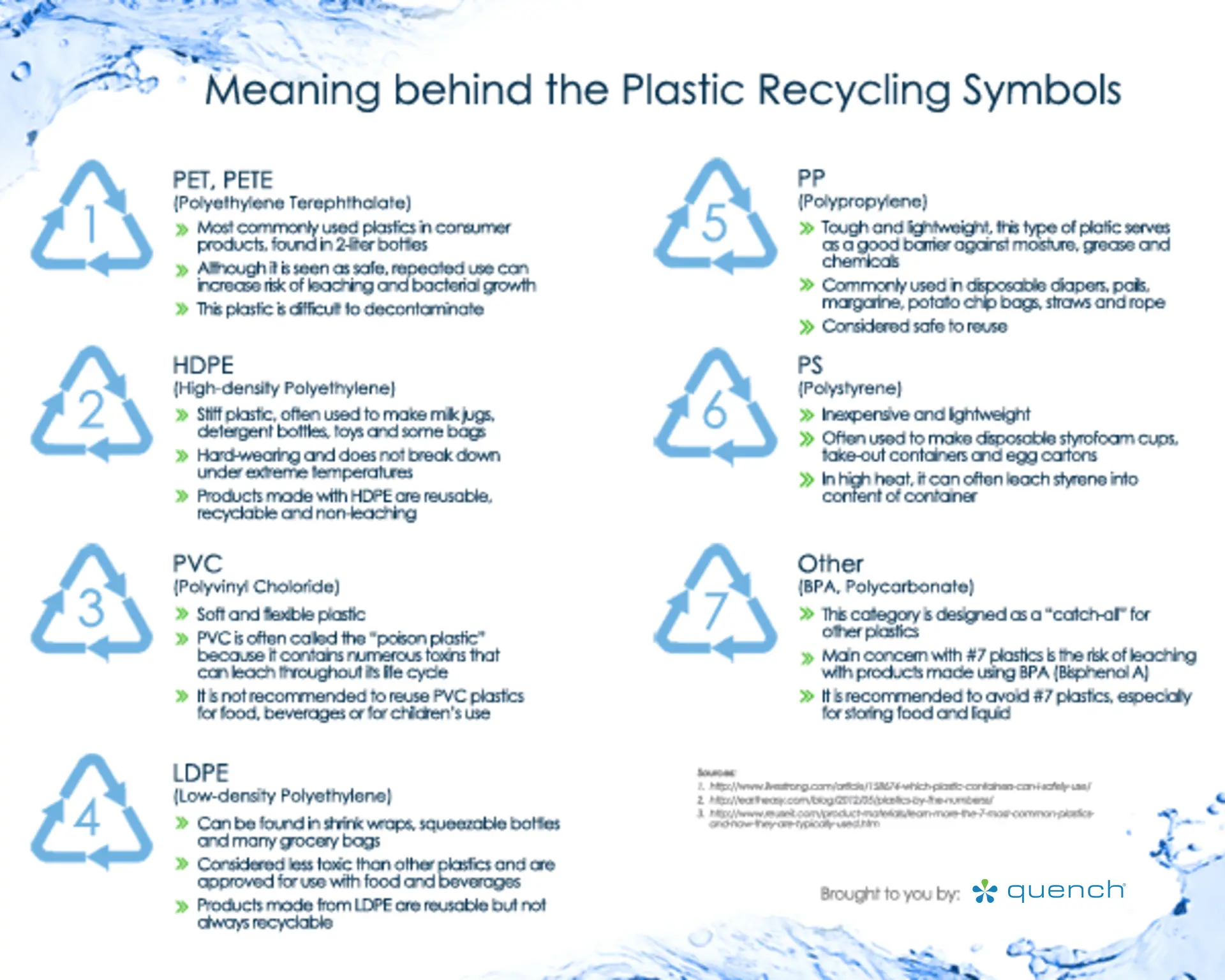
BPA Myths and Facts — How to Stay Safe
The FDA says it’s safe. Other studies disagree. Even the internet isn’t so sure. How are you supposed to dodge all these myths about “big, bad Bisphenol A” when making decisions about your food and water? The first step is to arm yourself with the facts. That way, you’ll be able to sniff out the truth and avoid unnecessary chemical exposure.
Here are a few things to know about BPA:
Myth: “All plastics are the same.”
Fact: Plastic might look like — well — plastic, but there’s a lot going on behind the scenes. That means not all plastic is created equal.
The secret is to look at the bottom of your plastic bottle or packaging. You’ll usually find a triangular shape with arrows, often called “chasing arrows.” The number inside represents the type of plastic that the bottle is made of. Plastic products labeled #7 are generally manufactured with BPA. According to Eartheasy.com, “Plastics with the recycling labels #1, #2, and #4 on the bottom are safer choices and do not contain BPA.”
Myth: “I’ll be safe as long as I don’t touch the bottle that’s manufactured with BPA.”
Fact: In many contexts, touching chemicals is a big no-no. However, that’s not necessarily the risk when it comes to BPA. In this case, it’s consuming chemicals that might be more worrisome.
Remember, BPA is part of all kinds of containers. Sometimes it coats the inside of your water bottle; other times, it might be an ingredient in food cans or plastic food packaging. Even though you don’t directly consume these things, BPA can potentially leach out of them, leading to increased dietary exposure.
This is especially true in high heat levels. A study done by the University of Florida states that, when heated, some plastic water bottles can release BPA — so don’t be tempted to pop them in the microwave or leave them in the car on a summer’s day.
Myth: “BPA-free options are always safe.”
Fact: These days, it’s extremely difficult to stay away from plastic, and even more difficult to determine which plastic types may and may not be entirely safe.
Take, for example, the “BPA-free” myth. It sounds like a good thing, right? Unfortunately, BPA isn’t the only chemical that could potentially impact human health.
The issue is that BPA is part of plastic packaging for a reason — so when it’s removed, manufacturers often need to find alternatives. In some cases, these BPA substitutes aren’t much better, because they’re chemicals, too.
Here’s what Lindsay Dahl, deputy director of the organization “Safer Chemicals, Healthy Families,” had to say to Fox News: “The chemicals have the same function [as BPA], which usually means they’re similar in structure, and therefore have similar health effects.”
The takeaway: Don’t accept things at face value; do your own research to find the truth.
Myth: “It’s possible to avoid BPA entirely.”
Fact: Unfortunately, you’re probably not going to be able to dodge this chemical in all its forms (although you might be able to cut most of it from your food and drinks). The good news is that you can avoid a lot of BPA with tips like these:
- Be aware of what plastics you’re using. You can use our guide above to track what number is within the chasing arrows and, thus, whether your plastic container might contain BPA.
- Try to use non-plastic containers when storing liquids or food. You can use glass or try to use frozen or fresh products.
- Get rid of plastics that are cracked or broken. If that plastic is made with BPA, it can transfer over to food or liquid you consume.
Mitigate the Risk of BPA Exposure in Your Workplace With a Bottleless Water Dispenser
You’ve probably heard about BPA one way or another, but that’s just the tip of the iceberg. If you’re just now uncovering all the controversy and confusion around this chemical, your first instinct might be to ditch that plastic bottle. There are plenty of alternative options, like glass or stainless steel, to help keep you hydrated.
But at work, that’s not the only step you have to take. After all, you and your coworkers probably drink from a water cooler — and guess what’s attached to that dispenser? If you said “a plastic bottle,” you’re all too right. Just like other plastic packaging, these bottles may sometimes contain BPA. That’s why a bottleless water dispenser is one of the best ways to help reduce the potential health risk of BPA exposure in the workplace.
What is a bottleless water dispenser?
A bottleless water dispenser is just what it sounds like. Instead of using plastic to store and dispense your water, these systems connect directly to your workplace’s existing water line. That means you have an endless supply of hot or cold water. Some systems even come with built-in reverse osmosis (RO) filtration, providing cleaner water for your whole workplace.
Why choose a bottleless water dispenser?
Your workplace probably knows the value of “going paperless,” but what about going bottleless? Here are a few reasons to say goodbye to plastic for good:
- It reduces BPA exposure: While you might still find BPA in other areas of your life, cutting down on exposure at work is a big step in the right direction. Think about it this way: Every time you grab a drink from a bottleless water dispenser, you’re cutting out one more chance for BPA to potentially cause harm to your body.
- It’s easy: In our grab-and-go world, no one wants to wait for a slow filtration or dispensing system. Luckily, the best bottleless water dispensers work intelligently so you can get water on demand.
- It can be much cheaper: When you choose a high-quality bottleless water dispenser, you’re getting a lot of bang for your buck. That means you and your teams don’t have to buy single-serve plastic bottles, which can quickly add up.
- It eliminates the need for bottle orders and delivery: Are you tired of scheduling water deliveries? Do you worry about running out of water because someone forgot to order more? If so, a bottleless water dispenser might just be music to your ears.
- It’s easier on your back and knees: Let’s be honest — you probably don’t love lugging water bottles around (and neither do your employees). It’s slow, inefficient, and sometimes unsafe. A bottleless water dispenser eliminates that problem for good — and your back, knees, and other joints will appreciate it.
- It encourages people to stay hydrated: According to research from the Virginia Polytechnic Institute and State University, dehydration can lead to poor concentration. Having a fast, easy source of water is a great way to encourage your coworkers to grab a drink whenever they can.
- It’s cleaner: As the Minnesota Department of Health explains, single-serve bottled water is sometimes just tap water with added minerals. The source of your water matters, as does its filtration and treatment — so don’t settle for something with a questionable background. Bottleless water dispensers are as trustworthy as your own water line (and sometimes more so, thanks to optional RO filtration).
- It’s more sustainable: BPA aside, traditional water dispensers and single-use bottles are bad news for the environment. If your workplace is looking for a sustainable water solution, you need a bottleless water dispenser to go with your reusable glass or stainless steel bottle.
Choosing Your Water Cooler With Quench
If your workplace has decided it’s time to kick plastic to the curb and cut down on BPA exposure, your next step is to decide exactly how you’ll make that possible. After all, sustainability has to be sustainable, right?
The key is to choose a bottleless water dispenser that fits your workplace. That way, people will actually enjoy using the system — which means they won’t bring single-use bottles full of BPA. But that’s easier said than done. It’s difficult enough choosing a traditional water cooler; how do you find one that fits your water line, has all the right features and does it all without breaking the bank?
Simple: Start with Quench. Here are a few things that make Quench the best choice for your water needs:
- Comparison tools: We have all kinds of water systems available for your workplace. Looking for countertop water dispensers? How about touchless dispensers or water coolers with ice makers? Whatever your path to better water looks like, we’re here to help. Our comparison tool helps you see each option side-by-side so you can decide which one is best for you.
- Easy installation: If you don’t know where your workplace water line is, there’s no problem — with Quench, installation is a breeze. We’ll figure out the details and install your bottleless water dispenser for you, so all you have to do is sit back, relax, and get your water bottle ready.
- Dependability: Once your bottleless water dispenser is installed, water will be at your fingertips whenever you need it. That’s because our systems are designed with longevity and dependability in mind. From a bustling warehouse to a quiet little startup, businesses of all shapes and sizes have found that their Quench dispensers can support just about any work style.
- Support: While you won’t need to stay in constant contact for water delivery, it’s good to know that we’re always available to offer support. If you have a question about RO filtration and filter replacement, we’re ready to help. Wondering if your dispenser needs maintenance? We can help with that, too. The goal is to eliminate all your water worries, allowing you to focus on your work while we do the rest.
Say Bye-Bye to Bisphenol A
If you’ve officially decided that BPA has no place in your workplace, we know just the solution. Bottleless water dispensers are a great fit for workplaces of all shapes and sizes, giving you 24/7 access to water without the hassle. Plus, they help you take control of your own health by cutting out some chemical exposure — and that’s great news for you, your employees, your customers, and your business overall.
Ready to go bottleless? Contact us today to get your free quote!
